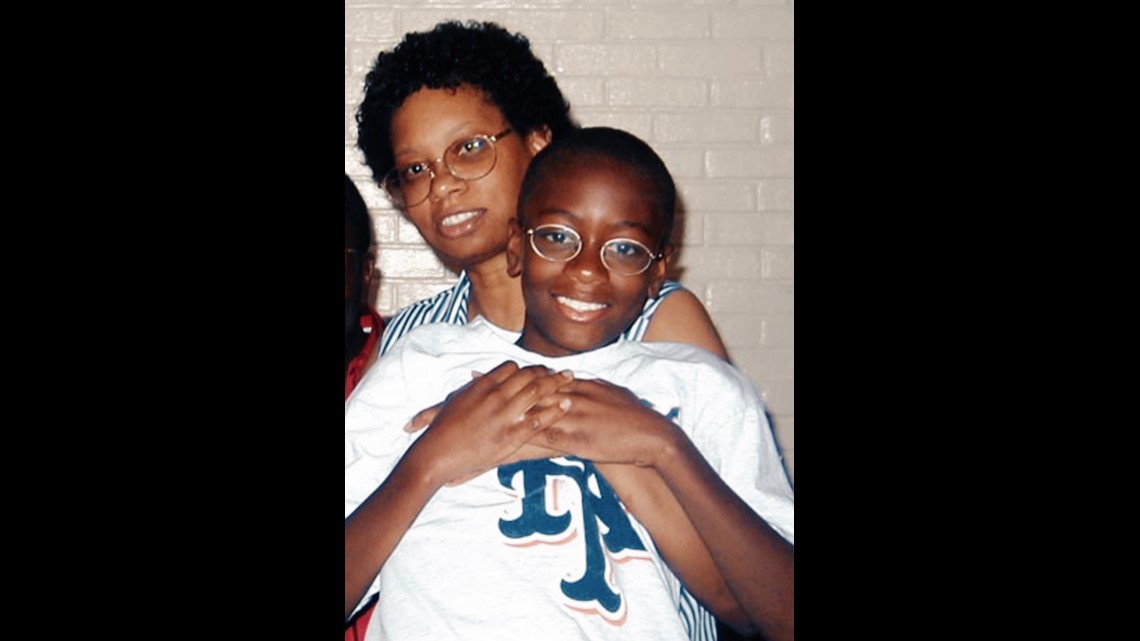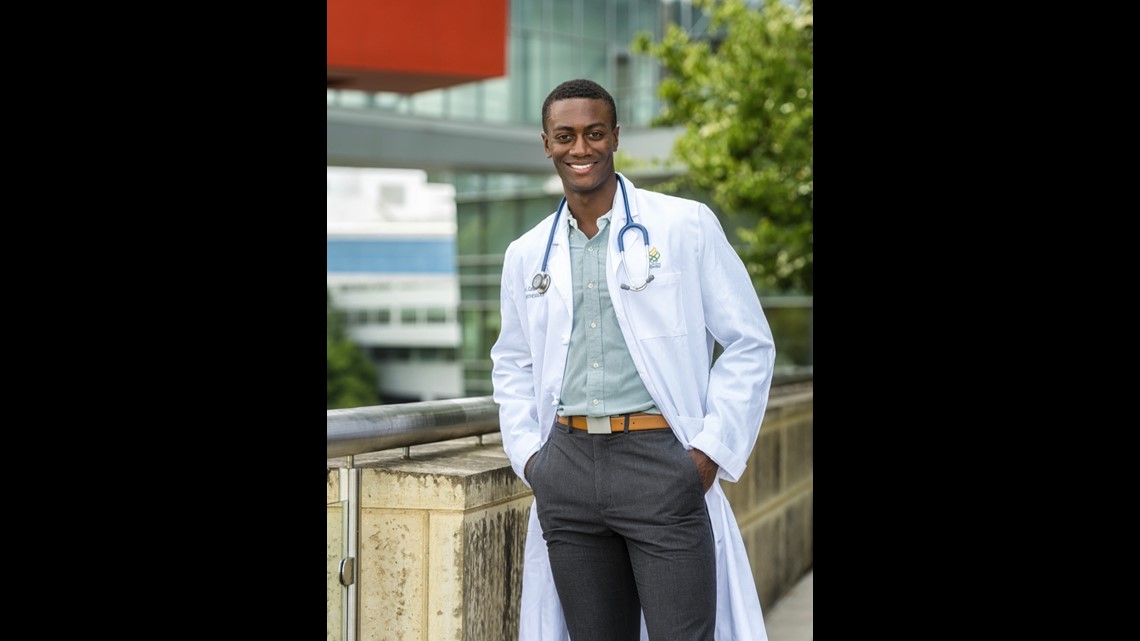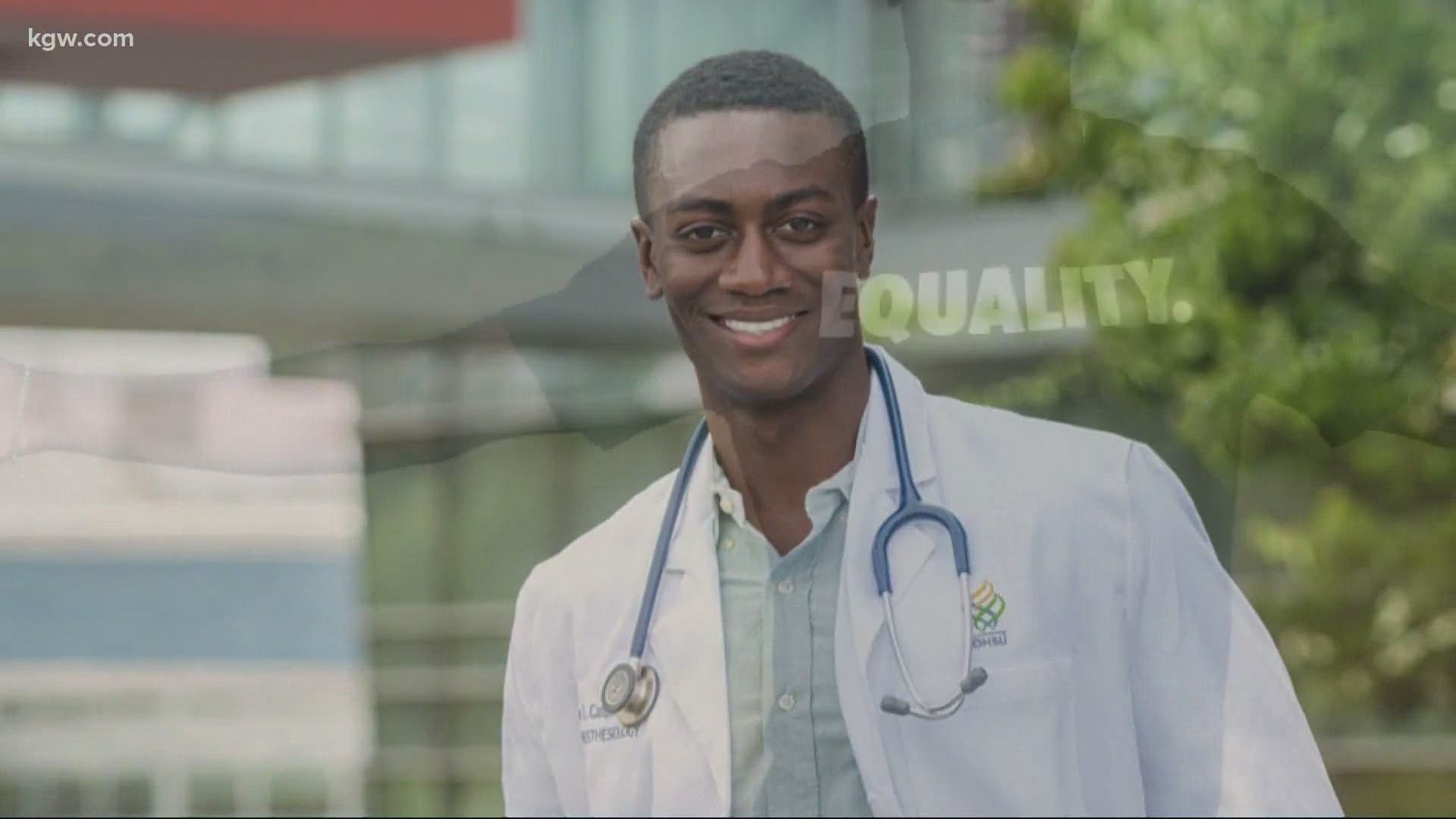PORTLAND, Ore. — You might recognize him from his dance moves on TikTok. Oregon Health and Science University Physician Dr. Jason Campbell, AKA the TikTok Doc, brought us levity while fighting a pandemic. Now, he is bringing us his truth as the country faces another crisis.
Dr. Campbell recently published an editorial in the Seattle Times, "Growing up Black in America: Why our souls are on fire."
“I was 7 years old when my mother yelled at me, 'Stop. Listen. Stop. If you don’t start listening to me, then you’re going to get yourself killed one day. Because the cops will only say stop once.'”


Dr. Campbell says it wasn’t until years later, until many shootings making the headlines later, that he realized what his mother truly meant. Now with America at a tipping point, he is sharing his story.
“I sit with the rage of my Black community, and I march with the nonviolent protesters. I write with no distinct answer, but there exists a perpetual myth that halts the conversation of progress: Only certain Black men become the result of such police brutality. I assure you that what has occurred with George Floyd or Ahmaud Arbery can happen to me or any male with my skin complexion. Understand, we as Black men are not given the benefit of the doubt. When I leave my home, I do not walk around with a sign that reads, “Dr. Campbell, former student-athlete at Emory University, Graduate & Former President of The Ohio State University College of Medicine student body, M.D., M.S. I am just another Black man.”


In the essay, he recalls watching Colin Kaepernick take a knee in protests of police brutality, only to be mocked by the crowd in the stands, all while cheering for the black players the protest was meant to protect.
Campbell also reflects on a traffic stop that ended peacefully, but was shrouded in fear that it wouldn’t.
He reminds us that the unrest happening in Portland and all around the country does not just come from the death of George Floyd, but from hundreds of years of oppression. He is calling on allies to not just stand beside people of color in the fight for racism, but to actively denounce racism and anti-blackness.
“When one watches the video of George Floyd on the ground with another man’s knee pressed into his neck, it is nearly impossible for these words not to haunt one with a distinct level of truth and accuracy. Irrelevant of profession or walk of life, we deserve an America that gives us the benefit of the doubt or at least an America that allows us to breathe.”
KGW’s Brittany Falkers talked to Dr. Campbell about his essay Wednesday morning:
Falkers: “Jason, those are such powerful words, and it’s your story and it’s your perspective. What made you want to put that to paper and let the world know?
Campbell: I mean, now is such a tough time for the black community for black men, for our allies that have long been unsupported. And it just felt like, this is something that – when I was young – I didn’t necessarily understand and as I’ve grown and as society has changed I realize that now is the time to speak up, to let people know what is happening, what is happening to all of us – regardless of our profession or our walk of life.
Falkers: Something that I think has been a really important point to make as we have these community conversations is that what’s happening on our streets isn’t just about this past week. It obviously came this week after the death of George Floyd, but this is hundreds of years of oppression that we’re talking about. What’s your thoughts on that and what do you want people to know about how we got here and coming to this point?
Campbell: There’s no way to kind of talk yourself out of it, as some people try to do, or make an explanation for this officer who had his hands in his pocket and his knee on his neck. It’s just, it’s so blatant and I think that this – it seems isolated, but recognize that there are so many incidents if you look back that have been similar to htis and lives that have been taken and people that can no longer share their story because unfortunately they’re no longer with us. And so, I just want people to recognize this is not an isolated incident. It’s just the most blatant incident that we have arguably seen thus far.
Falkers: Something I think is so powerful that you have written is that when you go out into the world – there’s not a name plate for your experiences or your successes and who you are. But at the same time, sitting back and reading that – I’m like – why should you need to have a name plate that says who you are. Can you talk about what that’s like to have to justify who you are?
Campbell: Yeah, it’s um, once again, maybe something that you don’t understand when you’re growing up. And then it’s when you have these different situations where – if I’m coming back from a sporting event or some event where I’m grouped as another black male – then whatever prejudice or stereotype one might give me. And so, it makes you say, ‘Well, why?’ It makes you think, 'I don’t deserve this. And my counterparts and my colleagues don’t have to go through this, not to the same level.' It’s frustrating and it definitely can be paralyzing and paralytic to some, if you will. You know, to have to live this day in and day out. So, once again – like you said – it’s not something we should have to deal with and it’s something that I hope we, as Americans, can move away from.
Falkers: You, of course, are a D.C. native -- Doctor JC of the DC – but Portland is your new home. What is it like for you to see that duality of what’s happening in your home city and your new city?
Campbell: Oh man, it makes me, well I miss my home city, as you can imagine, and to see what’s going on there -- it hurts. It hurts to see my city that I love being destroyed. Just like I’m sure for Oregonians and for people of Portland to see their city being destroyed. It’s true that we don’t want to lose the underlying reason, but I want constructive protesting and I think you see a lot of those who are protesting in – I’m not even going to say the right way – but doing it in a way where you’re not ruining things to speak up about the atrocities that are happening in the black community. So, I think it’s very unique for me to live in a city and be from a city – like many of the state. I think all of them – are going through this right now. I think it’s just, every night there’s a curfew and there’s unrest. And unrest is good. Unrest is necessary. It’s just I harken that we keep it as non-violent as possible so that people can hear us and that we keep our voices loud and clear.
Falkers: When we first talked to you during the pandemic about your TikTok videos, your positivity, your energy is something that – I continually go back and watch those videos and I continue to watch your videos when I need a positive boost. How have you been able to try to stay positive and bring that light when this is a really dark time?
Campbell: It’s really a blessing that some of my platform, or most of my platform, came to me right before this with TikTok and I can, and others, can speak to what’s going on right now and recognize that this is a big step forward. This is a big step in the right direction getting the chance to speak with you and getting a chance to write that piece for the Seattle Times and people want to hear. You know? There will always be people who don’t understand and don’t want to understand, but now there are a lot more people that are like, ‘Help me understand. Help me do better.’ Especially the allies that are not black themselves, but that say, ‘This is clearly wrong what happened to George Floyd’ and they have started to look back -- what’s happened to many others – it’s wrong and something they don’t want to stand for anymore and want to finally walk against this. Against this hatred and that’s really and exciting thing and something that gives me positivity and optimism for a better future.
Falkers: Now let’s talk about your perspective as a physician; seeing people really close together in the streets, obviously protesting for something that you really believe in, but also knowing that we’re in a pandemic and the coronavirus has not gone away.
Campbell: You know, so the latency period with this virus is about 14 days. And so, one would expect, maybe we’ll see an increase. I don’t have a fortune ball on me right now, so, I don’t know if that’s for sure, but I definitely hope that people are trying to be as cautious as they can. It’s tough right? Because there’s a mix here. There’s the pandemic and that’s a health crisis. Then there is the structured racism and the underlying prejudice that’s been going on for so many years – that’s it’s really a public health crisis to the black community. You will hear and see that documented many times over. And so, you have these two crises that are both plaguing America right now and like I said, I understand the protest, but I want to see people using hand hygiene, tying to maintain some level of just thought with what they’re doing; whether they’re yelling or they’re close to someone. If you’re wearing a mask. Just please be thoughtful about what you’re doing during this time, if you can.
Falkers: What advice do you have, when we talk about allies and allyship. What advice do you have moving forward? How can we create and continue constructive conversations in our community?
Campbell: Sure, it’s individual moments. It’s moments where you hear something. Like they say at the airport: if you see something say something, hear something say something. If you know it’s not right, if you no longer want to be associated with that person or group that is not allowing progress forward when it comes to diversity and inclusion and when it comes to being anti-racists and that’s a thing really, Brittany, that I think it’s no longer okay just to be complacent and silent and say, ‘Well, I didn’t say that.’ Or, ‘I did not participate in that activity. So, it’s okay.’ I need to talk against that. I need to act against that. And I’m going to be an anti-racist and help those that look like Jason and that come from that community. And earn the respect and justification that they deserve – just with human rights, just basic human rights. And so, it’s all about being an anti-racist now. Anything less than that is not helpful as an ally in 2020.

